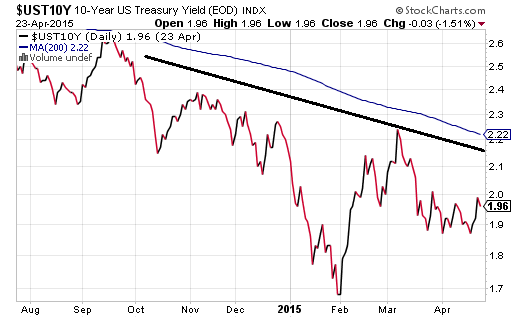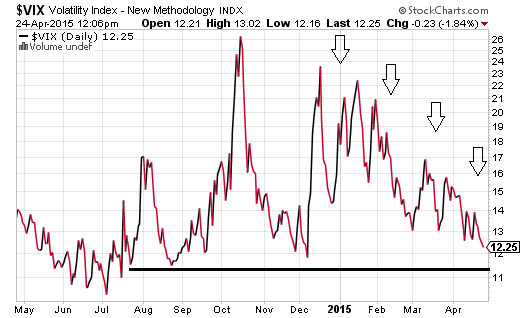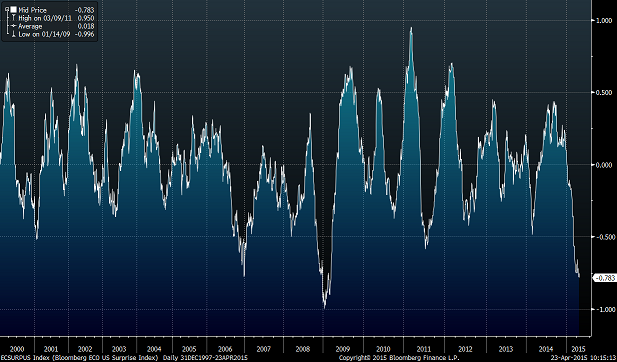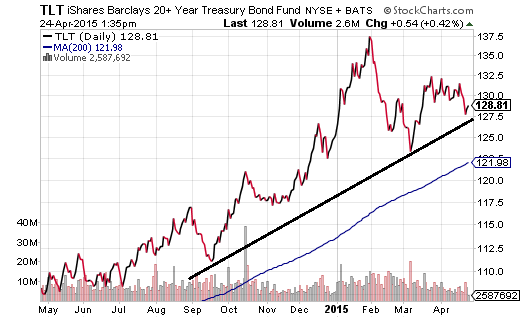What if the U.S. economy fails to pick back up from its dismal first quarter? Then the U.S. Federal Reserve will push off the frequency and the magnitude of any increases in overnight lending rates. That’s what the U.S. stock market is telling investors, as the S&P 500 and NASDAQ break above record highs. That’s what the U.S. bond market is telling investors, as the yield on the U.S. 10-Year Treasury continues an ominous descent.

Perhaps more surprising than the “bad economy-good market” dynamic is the degree of investor complacency. While the Chicago Board Options Exchange (CBOE) Volatility Index (VIX) is not necessarily registering utter disregard for the possibility of a stock sell-off in the next 30 days, the VIX is approaching 9-month lows. Indeed, the worse the economic news over the previous four months, the less insurance (via “puts” and “calls”) the investment community has required.

There are those who dispute that the U.S. economy is struggling, and that perhaps stock strength is a reflection of economic confidence. After all, aren’t equities supposed to keep rising until and unless genuine recessionary pressures build? If that thought were bullet-proof, stocks would be struggling like they did during the eurozone crisis in 2011 or like they did during the financial collapse in 2008. The Bloomberg ECO U.S. Macro Surprise Index – an index which measures whether economic data is beating forecasts or missing expectations – is hanging out at levels not seen since either crisis.

Of course, the “surprise” index simply evaluates data relative to economists’ estimates. Doesn’t that mean that forecasters were too optimistic about the economy as we entered 2015? Yes. Doesn’t it also mean that there is little reason to worry about the possibility of a recession? Hardly. The Federal Reserve Bank of Chicago publishes a monthly National Activity Index (CFNAI) that gauges the overall well-being of the U.S. economy. The CFNAI employs 85 indicators that span employment, unemployment, hours, consumption, housing trends, sales, orders and inventories. Not only is the CFNAI currently negative, its heralded 3-month moving average descended from to –0.27 in March from –0.12 in February. Simply stated, we are moving in the wrong direction and we are inching closer to contraction.
So why is there so little fear on the part of the investing public? For one thing, the U.S. Federal Reserve and the Federal Reserve Open Market Committee Members (FOMC) – the people who determine how and when to make changes to rate policy – value the Chicago Fed’s National Activity Index. Voting members recognize that the economy has been weak and it is showing signs of getting weaker. In essence, there’s virtually no chance that committee decision-makers will raise borrowing costs anytime soon.
Keep in mind, however, history has rarely been kind to stocks when economic growth is decelerating and earnings growth is stalling. Record stock highs in this environment begs the question, “How much faith in central banks is too much faith?” Granted, my clients are riding the central bank intervention wave with allocations to funds like iShares Currency Hedged MSCI EAFE (NYSE:HEFA) and WisdomTree Europe Hedged Equity (NYSE:HEDJ)). Moreover, we’re still holding long-time winners like iShares USA Minimum Volatility (NYSE:USMV) and SPDR Select Health Care (ARCA:XLV).
Nevertheless, I understand the value of multi-asset stock hedging; that is, late-stage bull markets require an allocation to non-stock assets that can perform well in bearish sell-offs as well as during times of economic uncertainty. Currencies such as the Swiss franc and the U.S. dollar tend to appreciate, even when the central banks of those countries may attempt to counter those trends. Long-term U.S. Treasuries tend to rise and yields tend to fall, even when our Federal Reserve waxes philosophic about “normalizing” the yield curve. Not only is the yield curve flattening, but the iShares 20+Year Treasury Bond Fund (ARCA:TLT) remains in its long-term uptrend.

Disclosure: Gary Gordon, MS, CFP is the president of Pacific Park Financial, Inc., a Registered Investment Adviser with the SEC. Gary Gordon, Pacific Park Financial, Inc., and/or its clients may hold positions in the ETFs, mutual funds, and/or any investment asset mentioned above. The commentary does not constitute individualized investment advice. The opinions offered herein are not personalized recommendations to buy, sell or hold securities. At times, issuers of exchange-traded products compensate Pacific Park Financial, Inc. or its subsidiaries for advertising at the ETF Expert web site. ETF Expert content is created independently of any advertising relationships.
